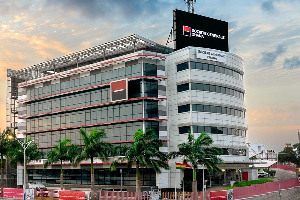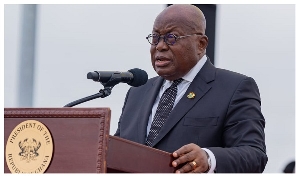- Home - News
- TWI News | TV
- Polls
- Year In Review
- News Archive
- Crime & Punishment
- Politics
- Regional
- Editorial
- Health
- Ghanaians Abroad
- Tabloid
- Africa
- Religion
- Election 2020
- Coronavirus
- News Videos | TV
- Photo Archives
- News Headlines
- Press Release
General News of Wednesday, 9 July 2008
Source: GNA
GWC: We're improving safety of water
Accra, July 9, GNA - The Ghana Water Company (GWC) says it has been undertaking reforms to improve on safety of drinking water delivered to consumers.
The company has also adopted scientific measures and proper managerial skills to ensure that water production and distribution processes remain hygienic, its Managing Director, Mr Andrew Barber, said in Accra on Wednesday.
Speaking at a workshop on Wednesday on Drinking Water Safety Plans (DWSP) organized by the Public Utilities Regulatory Commission in Accra, Mr Barber said it was equally the responsibility of consumers to keep water safe. He said quality production and treatment alone could not guarantee water safety and urged consumers to use the right materials to receive the product to avoid contamination. Mr Barber said years of under-investment and lack of maintenance had left the plants in bad shape but the company was doing all it could to ensure the highest standards of delivery and efficiency. "In all this what we seek to achieve is adequate supply of water at affordable prices, being responsive to complaints and maintaining consumer confidence through the quality of safe drinking water," he said. He said at times the integrity of the Public Utilities Regulatory Commission (PURC) was called into question when consumers complained of delivery of impure water to them, making them resort to other water producers.
Mr Barber cautioned against dumping of waste materials in water bodies that served as sources of drinking water and called on stakeholders to support water safety programmes of the PURC. Mr Andrew Quayson, Commissioner of the PURC, said currently, only 60 per cent of the population had access to potable water. He said the PURC had shifted focus from just testing water to ensuring that its production corresponded to best practices. Mr Quayson said the water quality regulation in Ghana was being reviewed to ensure that hazards were managed from the catchment to the distribution stage because of the health implications. Mr Nii Kotei, Water Director at the PURC, called for risk management in the water supply chain to ensure its safety and availability to consumers.
"It is important we get the needed commitment of all stakeholders in the management of drinking water quality," he said. According to him, the country's water standards were being updated by the Ghana Standards Board and Foods and Drug Board to include other parameters since water quality limits alone could not assure safe water. He urged private water producers to ensure the sources of water they delivered to consumers were safe and called for proper coordination between public and private water producers. Mr Michael Rouse, a consultant, said DWSP was a better way of managing drinking water from the catchment area to the taps of consumers using a system of risk management approaches. He said it was important the country adopted the DWSP because it had inbuilt elements of identifying the preventive measures for improvement and the amount of investment needed to meet implementation.










